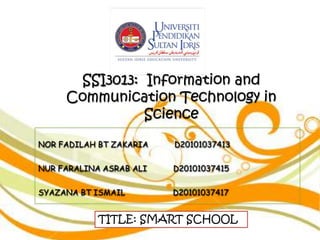Ict 2
- 1. SSI3013: Information and Communication Technology in Science NOR FADILAH BT ZAKARIA D20101037413 NUR FARALINA ASRAB ALI D20101037415 SYAZANA BT ISMAIL D20101037417 TITLE: SMART SCHOOL
- 2. Introduction A learning institution that has been systemically reinvented in terms of teaching and learning as well as the improvement of the school management processes. The Smart School project was introduced as one of the seven Flagship applications of the Multimedia Super Corridor (MSC), a gargantuan government project that aims at building Malaysia’s capability in the ICT area. The Smart School Flagship aims to reinvent the educational system in Malaysia in order to ensure the achievement of Vision 2020.
- 3. Provide all-round development of the individual (intellectual, physical, emotional and spiritual). Provide opportunities to Democratise education. Smart enhance individual strengths and School abilities. Initiative Produce a thinking Increase participation and technology of stakeholders. literate workface
- 4. Curiculum Teaching Teaching & and learning Pedagogy materials Learning Concepts Assesement
- 5. CURICULUM It has a different format in that the intended learning outcomes are explicitly stated at different levels. There are four knowledge to be infused in the Smart School curriculum The skills covered for the former are wider and include information technology skills PEDAGOGY Appropriate mix of learning strategies to ensure mastery of basic competencies and promotion of holistic development, Allowance for individual differences in learning styles to boost performance Classroom atmosphere compatible with different teaching-learning strategies
- 6. Assessment Element- Criterion- Holistic Based referenced Learner- Online centered Assessment
- 7. Teaching and Learning Material Meets curricular and instructional needs, is cost effective, as well as cosmetically and technically adequate . Cognitively challenging, attractive, motivates students to learn, and encourages active participation. Combines the best of network-based, teacher-based and courseware materials.
- 8. Technology as enabler Can a Smart Schools be implemented without IT??? • Gan (2000, p.81) maintains that, on the basis of the conceptual definition for Smart Schools that rests on the premise to educate Malaysian children for and with the tools of Information Age, “Smart Schools without IT will definitely not be able to produce generation of IT- literate Malaysian[s] ready for the challenges of the Information Age”.
- 9. • Technology help the Smart Schools to achieve their goals quickly and efficiently. • The blueprint gives examples of IT- enriched teaching and learning practices and their implications for IT. • “Every computer shall have access to the latest educational materials available locally, as well as to external resources” (ibid.,p.102)
- 10. Overview of Progress Wave 2 Wave 3 Wave 4 Wave 1 SSI rolled Consolidation Makes all Consolidate out to 87 of Smart school smart and stabilize Pilot Schools School by 2010 Technology principles (10000 becomes key Smart enabler in School) teaching & learning.
- 11. Challenges Faced During Inception of Smart School In Malaysia 1) Awareness of society - they feel Smart School are same with normal school - doesn’t know much about Smart School - Many people had the notion that the smart school was a school was a school for smart student only 2) Effort to prepare teachers as catalysts - they are the core of the nation’s education system thereby acting as changing agent for the nation 3) Limited internet coverage - especially in rural area 4) High cost
- 12. Conclusion The Smart School concept is very relevant to us as the Information age society. However, the implementation has its own resistance to deal with. So, various stakeholders include Ministry of Education, teachers, parents and students are committed to play their role effectively. Establishing a scientific and progressive society as to fulfill Vision 2020.







![Technology as enabler
Can a Smart Schools be implemented
without IT???
• Gan (2000, p.81) maintains that, on the basis of
the conceptual definition for Smart Schools
that rests on the premise to educate Malaysian
children for and with the tools of Information
Age, “Smart Schools without IT will definitely
not be able to produce generation of IT-
literate Malaysian[s] ready for the challenges
of the Information Age”.](https://image.slidesharecdn.com/ict2-121112025553-phpapp02/85/Ict-2-8-320.jpg)



